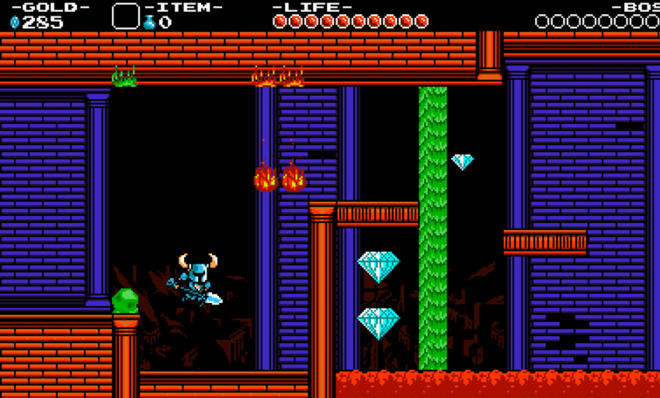You don't need cutting-edge technology to create great video games
Shovel Knight shows us how it's done


A free daily email with the biggest news stories of the day – and the best features from TheWeek.com
You are now subscribed
Your newsletter sign-up was successful
The sheer complexity of modern video games has become a major stumbling block to their production. Games these days require hundreds of skilled artists and programmers working together in precise harmony. And as I've argued before, today's capitalistic culture is inherently inimical to large-scale creative collaboration.
Thus many aficionados (and, implicitly, many top-shelf developers as well) have argued that one way to make a really good game is to restrict oneself technically. By working with "outdated" technical standards, it becomes easier to focus on making the game itself, instead of wrestling with complex software or arguing constantly with soulless corporate backers.
Which brings us to Shovel Knight, a recent title from Yacht Club Games that is deliberately limited in a technological sense. The aesthetic is a loving recreation of an 8-bit NES game from 25 years ago. Though it sneaks in a few slightly more modern innovations, like parallax scrolling, it largely sticks to the NES toolkit. It's got the same color palette, the same resolution, the same musical format, and the same simple controls. And as a Mario-style platformer (heavily influenced by Mega Man), it's square in the middle of classic NES genre territory.
The Week
Escape your echo chamber. Get the facts behind the news, plus analysis from multiple perspectives.

Sign up for The Week's Free Newsletters
From our morning news briefing to a weekly Good News Newsletter, get the best of The Week delivered directly to your inbox.
From our morning news briefing to a weekly Good News Newsletter, get the best of The Week delivered directly to your inbox.
And what do you know, it works! The design is solid and responsive, the story is compelling, and the combat is varied and interesting. And though I tripped over a few frustrating difficulty spikes mid-level, people who know what they're doing assure me it's actually quite a bit easier than true NES classics. Indeed, despite its throwback look, Shovel Knight differs quite sharply from the old games in many ways, most notably in the story, which is miles deeper and more mature than the typical NES "your princess is in another castle" twaddle.
I was particularly impressed with the art design, which was uniformly excellent. Low resolution means an artist is forced to rely on his talent, rather than technology, to create an appealing design; 8-bit MIDI music means a composer must create appealing melodies rather than rely on the typical standby of the sound of "an entire orchestra pit being simultaneously tased."
The game was funded through Kickstarter. While that is by no means a flawless choice — the developers reportedly nearly went broke before the game was released — it did mean that they could avoid the traditional publisher system and the crushing corporate bureaucracy that comes with it.
Ultimately, I think Shovel Knight is confirmation that today's gargantuan technological capabilities can be as much a burden as an opportunity, and conversely that it's totally possible to create excellent games without anything close to photorealistic graphics.
A free daily email with the biggest news stories of the day – and the best features from TheWeek.com
This may be a cultural development as much as a technical one. Ten years ago a retro-style game would have seemed dated and laughable, but Shovel Knight (and numerous similar titles) are eroding the connection between pixelly graphics and the time period in which they were cutting edge. It's increasingly hard to tell what era a game comes from just by an offhand glance at its graphical quality — a trend that will only gather strength.
So if there's some developer out there who's wavering on the fence between, say, picking an off-the-shelf engine or designing a custom one, I say don't hesitate to cheap out. Chances are, it will only help the final product.
Ryan Cooper is a national correspondent at TheWeek.com. His work has appeared in the Washington Monthly, The New Republic, and the Washington Post.
-
 5 blacked out cartoons about the Epstein file redactions
5 blacked out cartoons about the Epstein file redactionsCartoons Artists take on hidden identities, a censored presidential seal, and more
-
 How Democrats are turning DOJ lemons into partisan lemonade
How Democrats are turning DOJ lemons into partisan lemonadeTODAY’S BIG QUESTION As the Trump administration continues to try — and fail — at indicting its political enemies, Democratic lawmakers have begun seizing the moment for themselves
-
 ICE’s new targets post-Minnesota retreat
ICE’s new targets post-Minnesota retreatIn the Spotlight Several cities are reportedly on ICE’s list for immigration crackdowns
